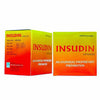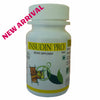
Viral infections are different from bacterial infections. In particular, the respiratory tract infections manifest in many forms like common cold, influenza, sinusitis etc. As such the respiratory tract is most prone to infections as it is exposed to external environment.
The immune system protects the human body against diseases and other potentially damaging foreign bodies. When functioning properly, the immune system identifies and attacks the pathogens while distinguishing them from body’s own healthy cells. The human immune system has two contributors for handling infections including viral infections – innate immunity and adaptive immunity.
Antiviral vaccines work by stimulating the adaptive immunity against viruses by administration of live attenutated virus or viral subunits. But these vaccines lose their efficacy if the virus antigenicity changes. Further vaccines have limited therapeutic effects.(Also see our other blog post on managing respiratory viral infections with Natoguard :- https://natturabio.com/blogs/news/how-to-manage-the-viral-infection-season-with-natoguard-range)
“Immunity boosters” aka high dose of supplementation with Vitamin C and Zinc is also doing rounds along with Probiotics to boost immunity. However, these are found to help only when a person is deficient in these vitamins and high dose consumption could cause undesired effects like kidney stone formation etc. (see Reference #1 below.)
Viral infections are particularly hard to treat as viruses can be seasonal, while spreading and mutating rapidly, requiring constant innovations in development of new antivirals and vaccines that are effective against the current strain of the virus. An added layer of complexity stems from the fact that most viral infections elicits an inappropriate immune response resulting in inflammation that can damage host organs, for instance respiratory viral infections can cause significant lung damage.
So, a productive antiviral response requires a delicate balance between supporting the immune system to fight the virus while protecting against overt inflammation that is detrimental to the host.
Herbal medicines and purified natural products provide a rich resource for antiviral drug development. There is rich tradition for the use of medicinal herbs as therapeutics in India. For thousands of years now Indian medicinal herbs have been used both prophylactically and as a treatment for a number of infectious diseases including viral infections. More recently, a number of clinical studies have validated this and numerous clinical trials to test the efficacy of ayurvedic formulations against viral infections are being initiated. Identification of the antiviral mechanisms from these natural agents has shed light on where they interact with the viral life cycle, such as viral entry, replication, assembly, and release, as well as on the targeting of virus–host-specific interactions. A number of phytochemicals have been shown to have potent antiviral effects due to their ability to inhibit viral replication through the suppression of viral genome synthesis, viral reverse transcriptase activity and viral protein production (through viral ribosome inactivation).
Various polyphenols widely present in fruits, vegetables are known to have immunomodulatory properties, and are able to modulate cytokine and chemokine production and activation of immune cells. Herbal medicines have long been used to treat and prevent viral respiratory infections. They have also been shown to have direct effects on the immune system, target pathways downstream of viral infections and act as potent bronchodilators to prevent against lung damage in the context of respiratory viral infections. Hence, the benefit of most of these herbal medicines having built-in immune-stimulating and inflammation-modulating effects is that they can help prevent immune overreaction (“cytokine storm”) while still helping the immune system cope better with the infections. Perhaps more importantly, Indian traditional medicines and ayurvedic formulations have been used for thousands of years and hence have been tested repeatedly for safety and efficacy in the clinic.
COVID 19
COVID 19 (SARS CoV2) mainly impacts with respiratory infections and inflammation. COVID 19 which seems to spread from person to person, mainly in form of droplets via coughing or sneezing. While the main symptoms remain cough, fever and sore throat, further diarrhoea, nausea and loss of smell and taste have also reported. For the majority (about 80%) of infected individuals this remains the only phase. However, for the remaining patients’ further complications like shortness of breath, pneumonia like symptoms and respiratory complications have been reported.
Overactive immune system: While a rapid and well-coordinated immune response represents the first line of defense against viral infection, excessive inflammatory innate response and impaired adaptive host immune defense may lead to tissue damage both at the site of virus entry and at systemic level. In particular, the massive cytokine and chemokine release, the so-called “cytokine storm”, in patients with COVID-19 clearly reflects a widespread uncontrolled dysregulation of the host immune defense.
Viral Infection: In order to cause disease, any virus must enter a human cell, replicate, and damage the cell, escaping to infect adjacent cells. For COVID-19, there are 3 enzymes that play a critical role in this sequence. They are named ACE-2, Furin and 3-CL protease.
SARS CoV2 enters human cells by attaching to a protein on the cell surface called ACE-2. SARS CoV2 binds to ACE-2 and dampens its enzymatic activity. It has been suggested that the progression from a minor viral illness to severe pneumonia, may reflect ACE-2 exhaustion, occurring several days after the initial symptoms. Natural substances like curcumin, resveratrol, Panax ginseng have been shown to enhance ACE-2 function.
Andrographolide from Andrographis paniculata as a potential inhibitor of the main protease of SARS-CoV-2 (Mpro) through in silico studies such as molecular docking, target analysis, toxicity prediction and ADME prediction.
In order for the COVID-19 virus to lock on ACE-2, the surface of the virus (the viral spike proteins) must first be altered by an enzyme called Furin. Natural substances that inhibit Furin activity include the herb Andrographis paniculate, the flavonoid luteolin. In addition to inhibiting Furin, luteolin was shown to directly block the entry of SARS-CoV-1 into cells by sticking to the surface spike protein.
Once they have entered human cells, corona viruses produce damage and spread to other cells by creating an enzyme called 3CL protease. Although several enzymes may be involved in viral replication and spread, 3CL protease is the most important for the corona virus family.
The researchers suggest that kaempferol, quercetin, luteolin-7-glucoside, demethoxycurcumin, naringenin, apigenine-7-glucoside, oleuropein, curcumin, catechin, and epicatechin-gallate in medicinal plants may inhibit 3CLpro. Epicatechin is found in green tea and citrus fruits are rich in naringenin.
More Herbs & Phytonutrients with Antiviral & Immunomodulatory Properties
Andrographis Paniculata has immune modulatory properties that help improve innate and adaptive immunity enabling to fight the pathogens. Andrographis Paniculata was proposed as a potent stimulator of immune system by two approaches. The first in driving an antigen specific response; antibody responses to counteract invading microbes. Second was a non-specific immune response; scavenging of microbes by macrophages. Apart from its anti-inflammatory effects, andrographolide also exhibits immunomodulatory effects by effectively enhancing cytotoxic T cells, natural killer (NK) cells, phagocytosis, and antibody-dependent cell-mediated cytotoxicity (ADCC). These properties of andrographolide form the foundation for the use of this compound to restrain virus replication and virus-induced pathogenesis. (Reference # 3)
Adhatoda vasica is bitter in taste and turns into hot potency. It is also an expectorant, cough suppressant and bronchodilator. Studies suggest that extracts have strong anti-influenza virus activity that can inhibit viral attachment and/or viral replication, and may be used as viral prophylaxis.
Licorice/Glycyrrhiza Gabra, has potent antiviral properties that might be in part due to the inhibition of virulence factors such as the hemagglutin proteins on the viral capsule. It remains an excellent demulcent for people of all ages and reliably loosens the dry cough within a day or at most two.
Withania Somnifera is an immune amphoteric, both stimulating immune response in low immune states and exerting an immunosuppressive action on B and T cell activity in hyper-immune/autoimmune states. It has been used for thousands of years to treat respiratory illnesses for its potent antimicrobial and anti-inflammatory properties.
Boswellia serrata is a tree gum extract that has been shown to inhibit Th1 cytokines and promotes Th2 cytokines, which helps to reverse the imbalance of Th1 and Th2 that increases inflammation.
Green tea (Camellia sinensis) has flavones and catechins, green is a rich source of particularly epigallocatechin-3-gallate (EGCG) in particular. EGCG has been reported to exert anti-inflammatory activity and show potent immunomodulatory effects.
Fruits & Vegetables:
Plants undergo a complex secondary metabolism are an excellent source of vitamins, minerals and medicinal compounds. The additive and synergistic effects of phytochemicals in fruit and vegetables are responsible for their potent antioxidant and immunomodulatory effects. The benefit of a diet rich in fruit and vegetables is attributed to the complex mixture of phytochemicals present in whole foods.
Many plants contain high amounts of polyphenolic compounds, such as the flavonoids, and several thousands are thought to occur in commonly used dietary plants and extracts. The flavonoids consist of six classes of compounds, the anthocyanidins, catechins or flavanols,flavones, flavonols, flavanones and isoflavones. A wide variety of these flavonoids – either as fruit juices, extracts or isolated compounds – have been extensively investigated in recent years. Among these dietary, antioxidant plant products, several have been investigated as adjuvants in the prophylaxis or treatment of infectious diseases. Accordingly, functional foods, defined as those providing specific nutrition or targeting multiple functional components, are considered a form of preventive medicine.
Conclusion:-
A combination of these herbs with antiviral properties and immunomodulatory action to regulate the immune system helps in managing the respiratory viral infections. While it is beneficial to know the action of herbs & phytonutrients, it is useful to know that there are few herbal preparations that could be taken prophylactically (prevention, Reference #4). This could make it easier to take polyherbs in suitable doses for the desired benefit.
With the major viral infections occuring every few years and even subsequent waves of COVID 19 expected, it may be required to use these herbal products on continual basis to keep up. However it is important to note that some of the phyto-herbal ingredients are to be used for limited term basis only when needed, as long term use may cause other effects.
So, choice of products that provide you a plan consider the above, are safe and work in multi-faceted manner is the way to go forward.
For further information on how herbal products could help manage viral infection and regulate healthy immunity, please read our other blog:-
https://natturabio.com/blogs/news/how-to-manage-the-viral-infection-season-with-natoguard-range
References:
2. https://www.tandfonline.com/doi/full/10.1080/07391102.2020.1760136
- June 24, 2020
- Makesh K






